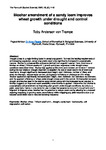Biochar amendment of a sandy loam improves wheat growth under drought and control conditions
| dc.contributor.author | Anderson von Trampe, T. | |
| dc.date.accessioned | 2022-12-23T20:13:09Z | |
| dc.date.available | 2022-12-23T20:13:09Z | |
| dc.date.issued | 2022 | |
| dc.identifier.citation |
Anderson von Trampe, T. (2022) 'Biochar amendment of a sandy loam improves wheat growth under drought and control conditions', The Plymouth Student Scientist, 15(2), pp. 1-18. | en_US |
| dc.identifier.issn | 1754-2383 | |
| dc.identifier.uri | http://hdl.handle.net/10026.1/20125 | |
| dc.description.abstract |
Drought stress is a major limiting factor in cereal crop growth. To meet the feeding requirements of an increasing population, cereal crop yields need to be significantly increased in a sustainable manner. Biochar is a charcoal-like substance derived from organic material. Here, the effects of biochar on wheat (Triticum aestivum L.) growth and stress responses under drought stress conditions were determined. Biochar was applied at 5% (w/w) and stressed plants weren’t watered during the four weeks of drought treatment to establish the rate of water loss in the different soil treatments. drought significantly decreased plant height, stem thickness, number of tillers, and shoot dry biomass, relative water content, and quantum efficiency of photosystem II in wheat. Biochar application significantly increased plant height, stem thickness, root and shoot dry biomass, and the quantum efficiency of wheat under drought stress and in the control. An interaction between drought and biochar seen in the relative water content along with the increased water use due to biochar suggests an improved water availability when biochar is applied. I determine that biochar is a sustainable soil amendment for improving plant growth under drought conditions, but only to a point, potentially making it unsuitable for use in areas that experience long term drought and aren’t irrigated. In irrigated areas, biochar has the potential to reduce water use by allowing for a reduced watering frequency, improving water use efficiency while mitigating any yield reductions due to an induced water-deficit due to reduced watering frequency. | en_US |
| dc.language.iso | en | en_US |
| dc.publisher | University of Plymouth | en_US |
| dc.rights | Attribution 3.0 United States | * |
| dc.rights.uri | http://creativecommons.org/licenses/by/3.0/us/ | * |
| dc.subject | Biochar | en_US |
| dc.subject | wheat | en_US |
| dc.subject | Triticum aestivum L. | en_US |
| dc.subject | drought, | en_US |
| dc.subject | sandy loam | en_US |
| dc.subject | food security | en_US |
| dc.subject | soil degradation | en_US |
| dc.subject | soil carbon | en_US |
| dc.title | Biochar amendment of a sandy loam improves wheat growth under drought and control conditions | en_US |
| dc.type | Article | en_US |
| plymouth.issue | 2 | |
| plymouth.volume | 15 |



